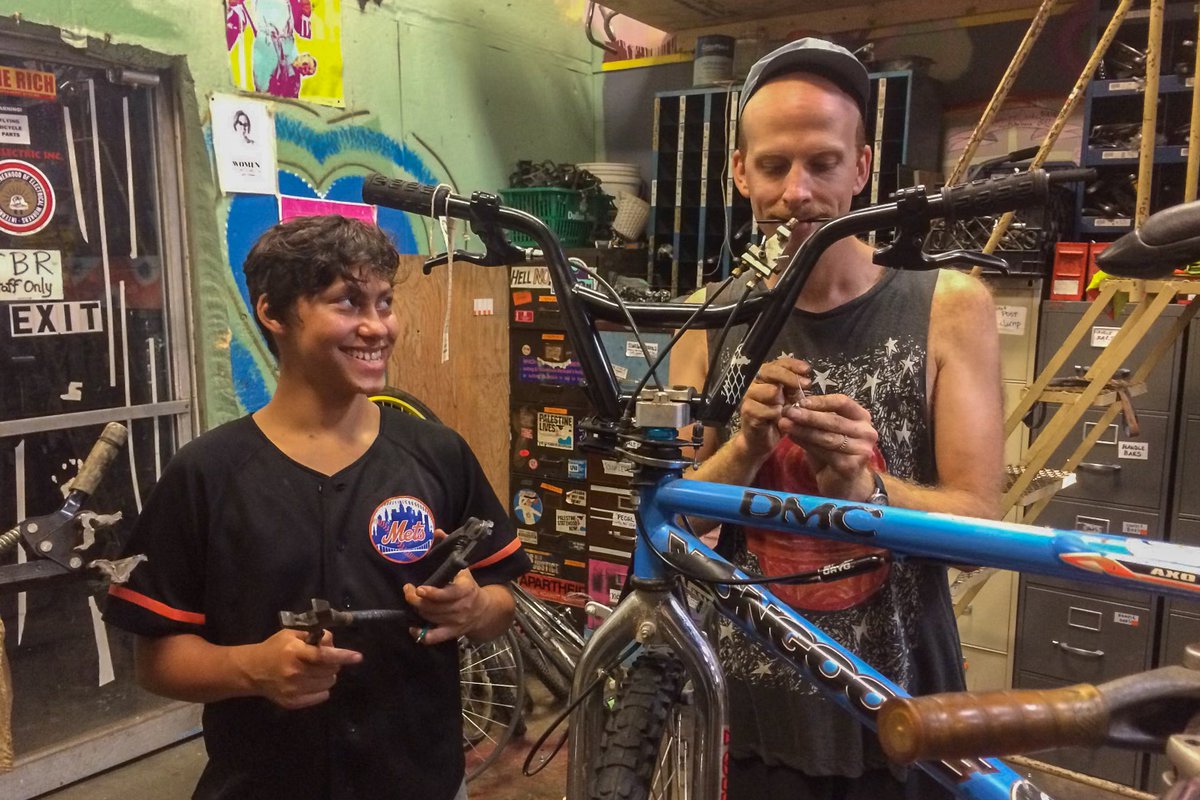Hugs from Troy: building bikes and community with Daniel Lander

Ten and a half years ago, Daniel Lander packed his bags, sold his car, and moved halfway around the world.
After working in the engineering industry for several years post undergrad, Lander was caught by “restless feet.” He reached out to Rensselaer Professor Christopher Letchford, whom he met at a conference while he was an undergraduate student at the University of Sydney. “I said to myself, if ever I would do graduate school, it would be with [Letchford] as an advisor,” Lander recalled. Letchford, who had just received an increase in research funding, offered Lander a position in the PhD program in the fall of 2012.
Upon arriving in Troy, Lander did not find what he expected. Growing up in Australia, he was exposed to America only through the “extremes” portrayed by the media. An image of a “big and crazy” America defined by Hollywood, mass shootings, and destructive winter storms lived in his mind. As he settled in, Lander was both surprised and comforted to find that Troy is full of “a lot of normal people doing normal things.”
Although Troy was a big change for Lander, it didn’t take long for him to find home. An avid biker, who chose to go carless while pursuing his PhD for “environmental and financial reasons,” needed an affordable way to repair his bike. He found a solution at Troy Bike Rescue, a nonprofit bicycle resource collective which aims to remove bikes from the waste stream and use bicycle education as a tool to build community. Lander didn’t initially set out to volunteer at the rescue. “I didn’t come from a family where that kind of community engagement was modeled,” he explained. As he became a familiar face at the rescue, other members of the collective encouraged him to put his mechanical skills to use during “Open Shop,” a space where volunteers assist community members with bike repairs.
It was through volunteering at the Rescue and other acts of community service, that Lander fell in love with Troy. He emphasized that one of the reasons he’s stayed in Troy is the sense of “reciprocity” he feels between himself and the city. “If I put in some effort, it’s almost as if the city would say ‘thank you’ and would give [me] a hug in return,” he said. The appreciation and acknowledgement that he felt “through the people [of Troy]” made him realize that, in terms of serving the community, “small efforts matter and go a long way.”
Not only has his passion for biking helped Lander build community connections, it has also granted him the opportunity to get to know Troy in “an embodied way.” To Lander, the protection of a car can act as an impermeable forcefield that has the power to both physically and emotionally disconnect a person from the world around them. The sensation of air on his skin coupled with the act of “using [his] physical body to move around and be constrained” makes riding a bike feel as if he’s traveling as an integrated part of the city. As the South Troy resident rides to Rensselaer’s campus or the bike rescue, he picks up on “different facades, different blocks,” and notices details like the “contours of the potholes” in the street. According to Lander, “The timescale [of bike transportation] permits you to traverse a small urban place like Troy with a lot of ease” while also “allow[ing] you to soak up quite a lot [from your surroundings].”
However, avoiding car travel did have its own difficulties. “You had to be really committed,” he said. “There were many times when there was a blizzard outside, and I had to [ride through it to] make a meeting.” There was also the challenge of making the trip home to Australia for visits. Lander described his route, which did not involve any car rides. He would take the 22 CDTA bus to the Greyhound station in Albany, the Greyhound bus to New York City, the subway to JFK Airport, and the train from the Sydney Airport to the station near his father’s home. “It was quite a long journey,” he recalled.
Over the years, as Lander transitioned from student to professor, he took a more intentional approach to discussing his career in community settings. “In Troy, everyone’s doing something really interesting,” said Lander. He feels that his identity as a professor “doesn’t need to take up space.” While he doesn’t hide that he teaches “on the hill,” he is sensitive to context. At the bike rescue, he tends to keep his profession “on the sidelines,” only mentioning it when he feels it will aid him in connecting with others.
Throughout his engineering career, Lander has focused on and been inspired by work that is centered around social and environmental justice. He co-founded “The Constellation Prize” as an “attempt to formally acknowledge on a national scale engineers who are using their technical capacity to assist in and work for empowering communities.” The prize serves as a way to remind himself and other engineers to take ownership of their skills and education and apply them for the betterment of humanity.
“We’re not trained to do that. Most of the people who end up doing this kind of work have a proclivity for that naturally,” he said. As a professor, Lander can “hold onto these values and embed them into the work” that he does, which is “possible while working in industry, but not as easily done.”
To find engineering work aligning with one’s values, Lander emphasizes the importance of “accepting that you might not have it right away,” while not becoming complacent. “Keep talking to people. Go to professional development [events] and conferences and keep looking for new opportunities,” he advises. In the meantime, Lander notes there is important work that can be done to change the industry from the inside.
“If [an engineer] is willing and open to seeing the way inequality exists in engineering systems and how these systems uphold that inequality, there’s opportunities to stay engaged in the things that matter [to them] through their work, wherever they are,” said Lander. “Every time an engineer engages with a system in a meaningful way, whether that’s doing calculations or just studying the system to develop an understanding, if they’re attentive, they will uncover ethical issues.” He noted that the NSPE Code of Ethics for Engineers has a well-defined process for escalating these issues to superiors. When this occurs, he urges engineers to be loud and speak up, but to be attentive to context. “Being a bulldozer isn’t likely to be the best way to create sustained and incremental change.”
Engineering firms can be stuck in their ways, but Lander believes that the firms can shift their values. He hopes for young engineers to feel empowered to “shift the culture,” reminding them they “have a lot of opportunity to come into a firm and infuse it with culturally relevant information and values.” Lander says, “Bringing their values into a place, caringly placing them there, and guiding others is a way to shift how things are being done.”
For Lander, the practice of “taking ownership” of one’s engineering skills extends far beyond the bounds of one's profession. Whether he’s helping someone fix a bike or “figuring out how to use Quickbooks to reconcile the Rescue’s accounts” as Treasurer, Lander credits his engineering education for enabling him to make meaningful contributions to the organization.
The Troy Bike Rescue is located at 3280 6th Avenue. Those interested in volunteering are encouraged to attend open shop hours, which occur weekly on Wednesday from 3-7 pm.

 Interview
Interview
 Academics
Academics